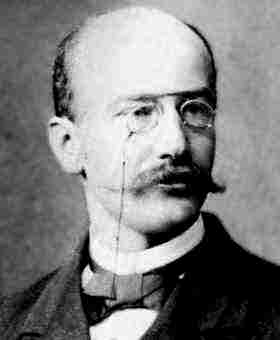<Back to Index>
- Mathematician Carl Louis Ferdinand von Lindemann, 1852
- Architect Antonio da Sangallo the Younger, 1484
- King of Denmark Christian IV, 1577

Carl Louis Ferdinand von Lindemann (April 12, 1852 – March 6, 1939) was a German mathematician, noted for his proof, published in 1882, that π (pi) is a transcendental number, i.e., it is not a zero of any polynomial with rational coefficients.
Lindemann was born in Hanover, the capital of the Kingdom of Hanover. His father, Ferdinand Lindemann, taught modern languages at a Gymnasium in Hanover. His mother, Emilie Crusius, was the daughter of the Gymnasium's headmaster. The family later moved to Schwerin, where young Ferdinand attended school.
He studied mathematics at Göttingen, Erlangen, and Munich. At Erlangen he received a doctorate, supervised by Felix Klein, on non-Euclidean geometry. Lindemann subsequently taught in Würzburg and at the University of Freiburg. During his time in Freiburg, Lindemann devised his proof that π is a transcendental number (Lindemann–Weierstrass theorem). After his time in Freiburg, Lindemann transferred to the University of Königsberg. While a professor in Königsberg, Lindemann acted as supervisor for the doctoral thesis of David Hilbert, Hermann Minkowski, and Arnold Sommerfeld. In 1882, he published the result for which he is best known, the transcendence of pi. His methods were similar to those used nine years earlier by Charles Hermite to show that e, the base of natural logarithms, is transcendental. Before the publication of Lindemann's proof, it was known that if pi is transcendental, then the ancient and celebrated problem of squaring the circle by compass and straightedge could not be solved.